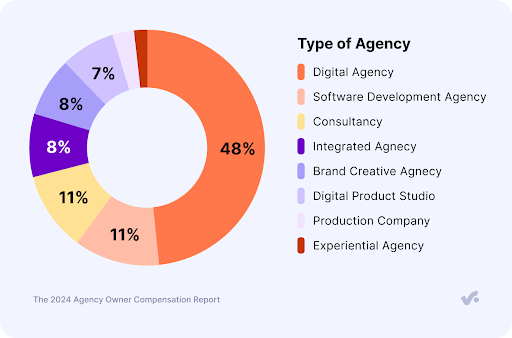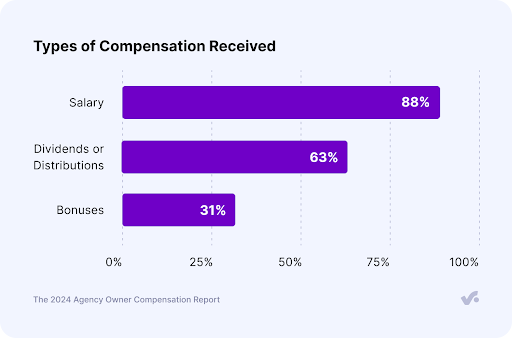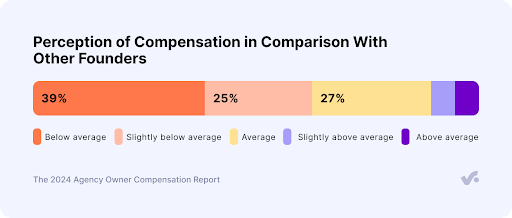Agency founders and owners are often the driving force behind their businesses. They shape company culture, ensure growth, and guide strategic initiatives. Indeed, it takes a lot of work for an owner to establish their compensation.
As an agency owner, you’ve probably asked yourself the following questions:
- Am I paying myself enough, or too much?
- Do I have all the data necessary to establish an adequate compensation plan for my partners and myself?
- Where do I/we stand in comparison with industry peers?
- Should our agency introduce employee ownership options?
As one of the leading global project management budget tracking platform, Productive talks to hundreds of agencies worldwide, week after week. Through time, the team noticed that often, compensation is spoken about, but mainly for employees. Agency owner compensation is a critical topic that doesn’t get much attention.
Who Participated in the Agency Owner Compensation Survey?
In July and August of 2024, Productive sent out a questionnaire to agency founders and owners across the globe, which 161 respondents participated in. The team wanted to understand compensation practices and tendencies better, plus provide insights that could help agency owners reshape their approach to compensation.Among the responses collected, around one-third of the agencies have one owner and another third have two owners, followed by 28% of the respondents having 3-5 agency owners.
The majority (80%) of participants are male. Nearly half of the agencies identify as digital agencies (48.4%), followed by software development agencies (11%), consultancies (11.8%), integrated agencies (8.7%), and brand creative studios (around 8%).

Regarding agency size, 65% of the agencies employ between 1-20 full-time employees, while 17% employ 21-30 FTEs. About 54% of agencies report annual revenues between $1-10 million USD.

Additionally, over half (52.2%) of the respondents established their agencies more than 10 years ago, while roughly a quarter founded theirs 5-10 years ago, and the remainder less than 5 years ago.
What Are Agency Compensations Like in 2024?
From the agencies that completed the questionnaire, three out of five owners are not the individuals earning the highest salaries within their companies, and 85% report challenges in determining their own salaries. Approximately 70% of agency owners earn profits from their business, while 30% have implemented some form of bonus system.
There is a noticeable link between an agency’s age and the type of compensation its owners receive. More established agencies tend to prioritize “stable” income sources like regular salaries, whereas newer agencies more frequently rely on bonuses and dividends as compensation.

Among the four types of compensation considered, 87% of agency owners receive a regular salary, while only 41% receive dividends. Additionally, 30% of owners receive distributions and bonuses.
One of the most interesting findings of this study is that only 9% of agency owners believe their peers earn higher salaries than them. Looking into overall satisfaction with compensations, one in five agency owners are not satisfied with their compensations.

While many founders feel underpaid compared to their peers, most actually earn at or above the average for their industry, with only a subset truly earning below average. These findings may indicate that founders undervalue their own compensation or feel pressured to meet an assumed income standard.
Over 55% of agencies have introduced an employee stock ownership plan (ESOP). Some agencies require specific criteria that employees have to meet to participate in the ownership program, although most agencies offer voluntary entry at specific times.
The Main Challenges in Establishing Agency Owner Compensations
Here are a few key reasons why agency founders and owners often find it challenging to determine their own compensation, as well as that of partners or co-founders:
1. Cash Flow Management
Ensuring a steady cash flow is frequently cited as a top priority, often leading agency owners to delay or forgo their own financial rewards to keep the business stable.
“My salary will fluctuate more than anyone else’s. In a bad period, I will sacrifice my salary. In a good period, I take a bonus.” (Anonymous survey respondent)
2. Differing Perspectives Among Partners
Compensation decisions can become contentious, especially when co-founders or partners hold differing views on what constitutes fair pay. These disagreements can lead to a delay or reduction in personal compensation.
“Business almost imploded after disagreements with the founding partner on our salaries vs. job descriptions. He ended up leaving when faced with realities of business revenues vs. his salary expectations.” (Anonymous survey respondent)
3. Lack of Industry Benchmarks
Many agency founders need more reliable benchmarking data, which can make it difficult to gauge appropriate compensation levels within their specific industry and business size.
4. Self-Doubt or “Impostor Syndrome”
It’s common for agency owners to experience self-doubt, especially when setting their compensation compared to high-performing executives, leading to hesitation in paying themselves higher salaries.
“When I wasn’t contributing as much, and my top executives knew all the numbers, having a heavy salary didn’t feel right. We also had some rough months, so I went to a distribution only for a year or two to let my team pull the salaries they had before I’d distribute money.” (Anonymous survey respondent)
5. Balancing Reinvestment and Personal Income
For many agency owners, there’s a constant balancing act between reinvesting profits to drive the business’ growth and taking personal income. Even though the impulse is often to reinvest, this can come at a personal financial cost.
How To Solve Agency Owner Compensation Issues?
It’s clear that there is no perfect formula for agency owner compensation policies, as we see that:
- 85% of agency owners have a problem defining their own compensations;
- only 40% of owners are satisfied with their salaries;
- and only 9% of agency owners believe they earn higher salaries than their peers.
To solve compensation issues, agency founders should focus on tracking profitability and investments, establishing objective compensation criteria, and setting straightforward methods for handling potential disagreements among partners.
The key is to stay informed, seek guidance when needed, and make choices that support both your business goals and personal aspirations.
To learn more about this topic, download the 2024 Agency Owner Compensation Report.


